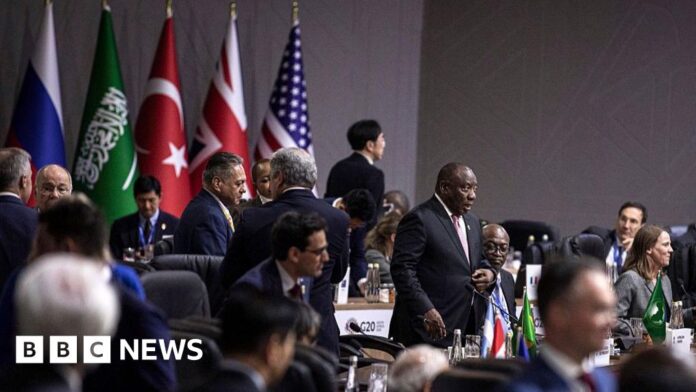The G20 summit in South Africa, a gathering of the world’s major economies, has ended with a joint declaration committing to “multilateral co-operation”.
The declaration, which covered climate change mitigation and economic inequality, was adopted despite objections from the US, which boycotted the meeting in Johannesburg.
Speaking at the closing ceremony on Sunday, South African President Cyril Ramaphosa said the agreement showed “shared goals” outweighed the countries’ differences.
American President Donald Trump chose to abstain from the G20 because of a widely discredited claim that South Africa’s white minority is the victim of large-scale killings and land grabs.
It was the first time a G20 summit was held in Africa. Indonesia, India and Brazil have led the summit over the past three years.
The US will host the G20 in 2026, with the summit expected to be held at Trump’s golf course in Florida.
The ceremonial handover of the presidency which was meant to happen at the end of the summit on Sunday did not take place.
It is expected to take place next week, involving junior officials.
Brazilian President Luiz Inácio Lula da Silva said “it didn’t matter much” that Trump had not attended, adding that multilateralism was “more alive than ever”.
German Chancellor Fredriech Merz said it had not been a “good decision” for the US to abstain.
He told Reuters news agency that what he had noted at the G20 was that “the world is currently undergoing a realignment and that new connections are being formed”.
Delegates also reached consensus on working towards “just, comprehensive, and lasting peace” in Ukraine, Sudan, the Democratic Republic of Congo and the “Occupied Palestinian Territory”.
The inclusion of Sudan is significant, according to Sudanese commentator and journalist Saeed Abdalla.
“I think for the first time, [at] the G20 now they bring the Sudan conflict [to the forefront] after more than two years,” he told local broadcaster Newzroom Afrika.
